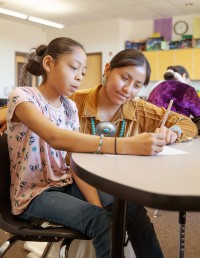Equity Demands That College Admissions Be Able To Consider Racial Identity
Removing race considerations in admissions for post-secondary education will not only serve to harm students of color seeking higher education, but it will also create obstacles for universities seeking the most qualified candidates.
NCYL joined 15 organizations to file a friend-of-court brief in the U.S. Supreme Court illuminating individual stories of students and the role race-conscious admissions played in their post-secondary education experience. The brief, written by NCYL’s Education Civil Rights Alliance and Lieff Cabraser Heimann & Bernstein LLP, contributes to the records of two cases currently pending before the U.S. Supreme Court that could fundamentally reshape college admissions by restricting race-conscious admissions.
The brief highlights research on how experiences related to racial identity contribute to the skills students bring to succeed in college, and can reveal attributes such as maturity, resilience, intellectual curiosity, honesty that allow the admission of smart and talented students, contributing to a more dynamic and enriching educational experience for all students.
Students of color deserve to highlight identity- and race-related accomplishments that add value to college careers. We should uplift markers of identity for students, like obligations and achievements in cultural, familial and religious activities.
To base all admissions on narrow, resume-based criteria will exacerbate existing inequities in postsecondary admissions due to racial disparities in public elementary and secondary school funding, and will exclude students from learning environments in which they are otherwise prepared to succeed and excel.
Allowing colleges to instead consider authentic experiences that exist outside of standard resume entries will foster the dynamic, studious, and creative campuses that universities and colleges seek to create.
In the brief, students of color testify to the profound impact of their cultural and racial identities in their college admissions experience. Itzel Vasquez-Rodriguez, an indigenous Mexican-American from Southern California, graduated from Harvard College cum laude with the highest honors in sociology. When asked about making her application essay race-blind, she stated “[a]ll of my life’s ambitions revolve around communities of color and my ethnoracial identity.” Vasquez-Rodriguez’s motivation, passion and success in her studies showcase the harmony of identity and academia when a student is given full consideration.
Another student at Harvard, Sally Chen, reflected on how being the daughter of Chinese immigrants and growing up translating and advocating for them shaped her views and dedication to social responsibility and community advocacy. College counselors cautioned against writing her application essay about her experience, but she persisted as facing cultural-linguistic barriers “was really fundamental to explaining who I am.”
“Competitive colleges want talented and diverse student bodies. Without race-conscious admissions, that goal is impossible both because of the inequities in public K-12 education and because of the centrality of race to the identities of young people of color,” said NCYL’s Miriam A. Rollin, an attorney and Director of the Education Civil Rights Alliance. “I am proud to have brought together a range of Education Civil Rights Alliance members and allies – including the National Center for Youth Law – to ensure that the United States Supreme Court understands the important role that race-conscious admissions must continue to play in post-secondary education.”
Sally and Itzel shared their authentic selves on their college applications, to the benefit of the Harvard community. All students deserve the opportunity to do the same.
Signatories to the brief include the following members and allies of the Education Civil Rights Alliance: Civitas ChildLaw Center; Clearinghouse on Women’s Issues; Education Deans for Justice and Equity; Feminist Majority Foundation; Intercultural Development Research Association; National Center for Youth Law; National Immigration Law Center; Native American Disability Law Center; Peer Defense Project; Public Counsel; Shriver Center on Poverty Law; Society for the Study of Psychiatry and Culture; Southern Coalition for Social Justice; Teach For America; and Washington Lawyers’ Committee for Civil Rights and Urban Affairs.






